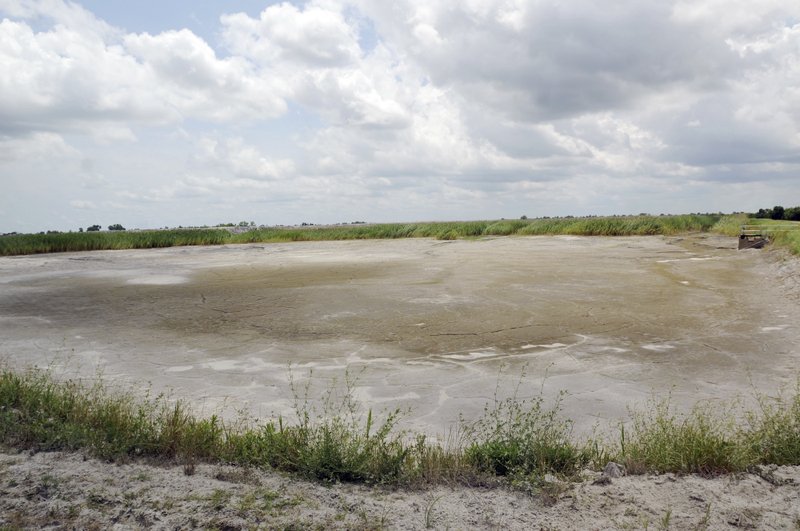RALEIGH, N.C. (AP) — A string of decisions by North Carolina regulators means electricity consumers could be seeing a multibillion-dollar bill to clean up mountains of waste Duke Energy created by spending decades burning coal to produce power.
State utilities regulators late last month decided that both North Carolina divisions of the country’s No. 2 power company could charge ratepayers the first $778 million chunk of a cleanup projected to cost about $5 billion.
Cleanup became a priority after a major leak from a Duke Energy site in 2014 left coal ash coating 70 miles (110 kilometers) of the Dan River on the North Carolina-Virginia border. The waste byproduct contains toxic metals like lead, mercury and arsenic.
The company pleaded guilty to federal environmental crimes in 2015 for its coal ash handling, and thus admitted “pervasive, system-wide shortcomings,” the North Carolina Utilities Commission said in its ruling last month.
North Carolina Attorney General Josh Stein said he’s going to court to try stopping Duke Energy from passing along its costs to excavate some ash pits and cover others. Corporate mismanagement increased costs that shareholders should also be forced to bear, he said in an interview. Duke Energy said that it followed industry practices and applicable regulations.
“This case will ultimately be decided by the North Carolina Supreme Court,” Stein said.
A decision by the state’s highest court isn’t likely before next year, when 3.4 million North Carolina power customers finally learn if they’re on the hook for a bill that’s been accumulating for decades.
Decisions by the North Carolina Utilities Commission last month and in February largely agreed with Duke Energy’s argument that consumers should pay for cleanup as part of the bill for the affordable, consistent electricity that burning coal had long provided.
It marks one of the commission’s most controversial regulatory decisions of recent years. But the precedent for passing on coal ash costs was set last year prior to the Duke Energy decisions in a case involving Virginia-based Dominion Energy, which serves North Carolina’s northeast corner, said Don Bailey, who served four years on the commission ending last year.
“The Dominion decision about a year ago may have been some indication of what was going to take place” in the Duke hearings, Bailey said. “It wasn’t anywhere near the kind of money we’re talking about now.”
The two utilities commission decisions Stein promises to challenge involve Duke Energy’s two North Carolina subsidiaries.
The company’s Duke Energy Carolinas subsidiary, which operates in central and western North Carolina, could charge its customers the $546 million in coal ash cleanup costs incurred from 2015 to 2017, the commission decided June 22.
But the regulator also found fault with Duke Energy’s practices and assessed a $70 million mismanagement penalty. The company’s “irresponsible management” of its ash pits “has resulted in cost increases greater than those necessary to adequately maintain and operate its facilities,” commissioners wrote.
Still, consumers will pay about $476 million of the cleanup cost and the company’s shareholders about 13 percent of the subsidiary’s bill so far.
In February, the utilities commission allowed the company’s Duke Energy Progress operating subsidiary, which serves eastern North Carolina and the Asheville area, to charge customers $232 million for coal ash cleanup costs racked up already. Regulators simultaneously assessed the company a $30 million mismanagement penalty.
North Carolina is Duke Energy’s most important territory. The company has 7.6 million customers spread over several states, including South Carolina, Florida, Indiana, Kentucky and Ohio.
Related Stories
‹

Duke Energy Building Coal Ash Recycling Plant in MoncureBy Casey Mann, Chatham News + Record Staff Duke Energy is constructing a coal ash recycling unit on the property of its former Cape Fear plant in Moncure with the goal of excavating the coal ash in basins there, helping it meet the state-mandated basin closure deadline and providing another use for the discarded ash. The […]
![]()
Duke Energy Agrees to Remove Coal Ash in North CarolinaThe state of North Carolina says it has secured an agreement with Duke Energy to excavate nearly 80 million tons of coal ash at six facilities. The Department of Environmental Quality said in a Thursday press release that it will be the largest coal ash cleanup in the nation’s history. It also settles various legal […]
![]()
Duke Energy Sued for 2014 Coal Ash Spill Environmental HarmThe federal, North Carolina and Virginia governments asked a court Thursday to declare the country’s largest electricity company liable for environmental damage from a leak five years ago that left miles of a river shared by the two states coated in hazardous coal ash. Government lawyers sought to have Charlotte-based Duke Energy declared responsible for […]
![]()
Study: Heavy Metals in N Carolina Lake Bottom ExtensiveA toxic stew of coal ash has spilled repeatedly and apparently unnoticed from storage pits at a Wilmington power plant into an adjoining lake, according to a Duke University scientist who said Monday that flooding last September from Hurricane Florence was only the latest example. The concentrations of lead, cobalt and other heavy metals detected […]
![]()
N Carolina, Duke Energy Contest Coal Ash Cost, Removal ScopeNorth Carolina’s environmental agency exceeded its authority by ordering Duke Energy Corp. to dig up all of its coal ash and move it from unlined storage sites where toxic chemicals have seeped into water supplies, the country’s largest electric company said Friday. Duke Energy said an administrative challenge to the state Department of Environmental Quality […]
![]()
Duke Energy to Contest N Carolina Coal Ash Excavation OrderThe country’s largest electric company says it’s challenging an order by North Carolina’s environmental agency to excavate coal ash from all of its power plant sites in the state. Duke Energy Corp. said Thursday it will file an administrative appeal by May 1. The order could cut the risk of toxic chemicals leaking into water […]

Tests: Few Heavy Metals in River After Coal Plant Dam BurstDespite the gray muck that fouled the Cape Fear River near a Wilmington power plant after Hurricane Florence, water tests so far show heavy metals contained in coal ash are within state standards, North Carolina environmental officials said Thursday. Water quality samples collected over four dates within two weeks of Florence crashing ashore a few […]
![]()
Duke Says Its Data Show No Harm From Flooded Coal Ash DumpDuke Energy said Monday that results from water samples collected downstream of a flooded North Carolina coal ash dump show no negative impacts to the Cape Fear River. The data Duke released were from a sample collected over the weekend after a dam breached Friday at the reservoir for the L.V. Sutton Power Station near […]
![]()
Attorney General Challenges Regulators Over Coal Ash ChargesNorth Carolina’s attorney general on Wednesday challenged regulators for allowing Duke Energy to start charging consumers hundreds of millions of dollars to clean up coal ash dumps and add a potential profit margin. State Attorney General Josh Stein’s office said in a filing to the North Carolina Utilities Commission he considers its decision to pass […]
![]()
Duke Energy Wants End of Case to Clean Tainted GroundwaterA state appeals court will hear whether it should allow a five-year-old lawsuit trying to force Duke Energy Corp. to clean up groundwater contaminated by its North Carolina coal ash pits. The Charlotte-based electricity utility argues to the Court of Appeals on Thursday that the lawsuit should be dismissed. Duke Energy lawyers say the company […]
›



